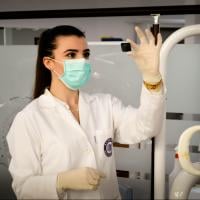FDA Explores Review Framework for AI-Based Medical Devices

We’re beginning to see real-world examples of the transformative potential of artificial intelligence and machine learning technologies for health care.
The health care system in the US generates approximately a trillion gigabytes of data annually. Along with AI, ML, and the availability of less expensive large-scale computing power, the potential exists for new innovative therapeutics and making existing ones more effective.
For those with serious health issues, recognizing early signs of disease could mean quicker treatment and better outcomes. Last year, the Food and Drug Administration authorized the first AI-based device for detecting diabetic retinopathy in adults with diabetes. Also approved was a clinical-decision support tool that uses AI to alert providers of a potential stroke in patients.
As more medical devices are developed that employ AI and ML software that can learn from real-world feedback and adaptation, the FDA also announced it is taking initial steps to explore a new medical device regulatory framework that allows for these developments.
The AI technologies authorized up until now are referred to as “locked” algorithms. As such, they may be periodically modified by the manufacturer, which can include training the algorithms using new data, manual verification, and validation. However, as product development moves beyond locked algorithms, new adaptive ML algorithms that continually evolve by learning from data through real-world use could prove to be of great benefit in health care.
“As algorithms evolve, the FDA must also modernize our approach to regulating these products,” reads the statement from outogoing FDA commissioner Dr. Scott Gottlieb.
As part of an evaluation process to ensure these AI-based devices are safe, the FDA is looking for feedback on a newly released paper, “Proposed Regulatory Framework for Modifications to Artificial Intelligence/Machine Learning (AI/ML)-Based Software as a Medical Device (SaMD).”
“The traditional paradigm of medical device regulation was not designed for adaptive AI/ML technologies, which have the potential to adapt and optimize device performance in real time to continuously improve health care for patients,” reads the paper. “The highly iterative, autonomous, and adaptive nature of these tools requires a new, total product lifecycle (TPLC) regulatory approach that facilitates a rapid cycle of product improvement and allows these devices to continually improve while providing effective safeguards.”
As we learn more about AI algorithms and how they can be used in the health care industry, we can begin developing safety-critical, beneficial, and innovative medical products.

